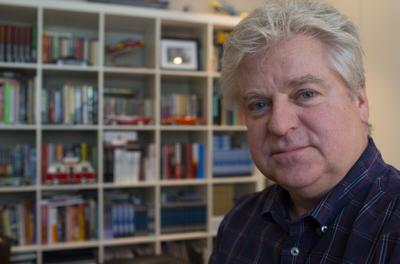Why crime fiction?
After all, for nearly 15 years, I wrote three alleged humour columns a week for this very newspaper. (I always say alleged, since for those who read it and did not get it, perhaps it was not a humour column.) When I left the Star more than six years ago to write novels full-time, why not 100,000-word comic romps? Why murder and mayhem? Why such an abrupt shift in tone?
The thing is, it wasnãt as big a shift as many readers thought.
I was going back to what Iãd always set out to do. I was writing mystery novels in my teens and early 20s, but could not, at the time, find a publisher for them. Looking back, we can all be grateful for that. Especially me. (Iãve been asked if Iãd like to dust those manuscripts off now, and finally see them published. Not. A. Chance.)
So, given that I was not going to come out of university a bestselling writer, I went into newspapers at the age of 22. I would get paid to write, even if it wasnãt a mystery, every single day.
And I loved it. I had, as they say, a good run. But despite spending 30 years in the business, Iãd never abandoned the goal Iãd had as a very young man.
The first novels I ever read were crime novels. Granted, they didnãt star Sam Spade or Philip Marlowe or Sherlock Holmes. These mysteries were solved by a couple of young pups known as the Hardy Boys. I devoured those books, and before long Iãd moved on to Agatha Christie and the Nero Wolfe stories by Rex Stout. In my mid-teens, I was into Raymond Chandler, Dashiell Hammett and my all-time favourite, Ross Macdonald, creator of that iconic private eye Lew Archer.
Plus, I was a TV crime adventure addict. The Man from U.N.C.L.E., Mission: Impossible, Columbo, Mannix, Harry O. I couldnãt get enough of those shows, and at one point in my teens I wanted to write TV screenplays. (There was not a big demand for this in Fenelon Falls, where I was attending high school.)
What drew me in large part to all these stories was their sense of drive, of momentum. They begin with some kind of hook: the crime. This is followed by the investigating, the unravelling, the meting out of justice. Order is restored.
No other kind of storytelling relies on strong plotting in the way crime fiction does. Everything is linked. Each development in the story leads to another. It is the proverbial onion being revealed layer by layer. Plot is the engine. It is, to a crime novel, what swimming is to a shark. Without it, everything dies.
Thatãs why Iãm drawn to crime fiction. I need that structure. I need that device to move the story forward. Itãs the spine that everything hangs on.
But plot is not where the work ends in a good thriller. There must be more than just some clever Rubikãs Cube-like gimmick. The plot needs to work. It needs to be organic. The best plots are those that, once all has been revealed, make sense. Thereãs been no jamming of square pegs into round holes, no peeling the stickers off that Rubikãs Cube and putting them on the side where you need them.
Some critics see that aspect of crime writing as formulaic, that this focus on plot somehow diminishes the work. I donãt buy that. Crime fiction places greater demands on an author. It forces the author be in total control. Youãre not just throwing a bunch of words onto a page. You are building a Swiss watch.
None of this is to suggest the other aspects of a good novel are neglected. In addition to a strong plot, the best crime fiction features excellent characterization, terrific dialogue, a sense of place. And good old fashioned fine writing.
A great crime novel can be great literature. It can have something to say.
Take the late Macdonald. He used the conventions of the crime novel to tackle issues that concerned him. Environmentalism, the corruption of wealth, alienated youth. More recently, James Lee Burkeãs The Tin Roof Blowdown is set against the backdrop of Hurricane Katrina and the governmentãs appalling lack of response.
Once, on a panel at a crime fiction conference, I sat next to the superb writer Thomas H. Cook, who told some aspiring authors that if there was an issue they felt strongly about, but couldnãt figure out how to go at it, ãput a crime in it.ã
That crime will drive the story.
The truth is, I wish there were a simple formula. Iãve just finished the first draft of my 15th novel (the second book in an upcoming trilogy, the first of which comes out next year) and Iãd like to say it gets easier, but it doesnãt. You want every book to be better than the one that came before it, and the key to that?
A plot youãve never done before.




























To join the conversation set a first and last name in your user profile.
Sign in or register for free to join the Conversation